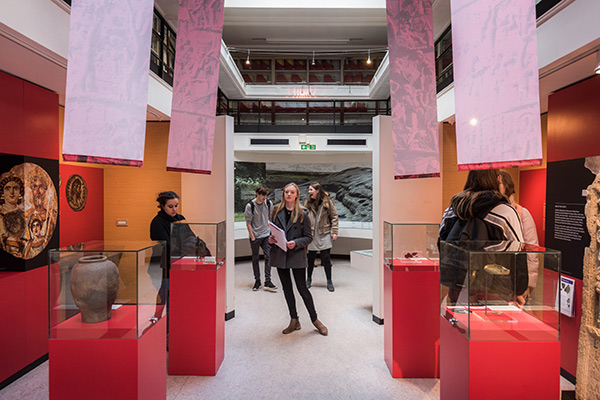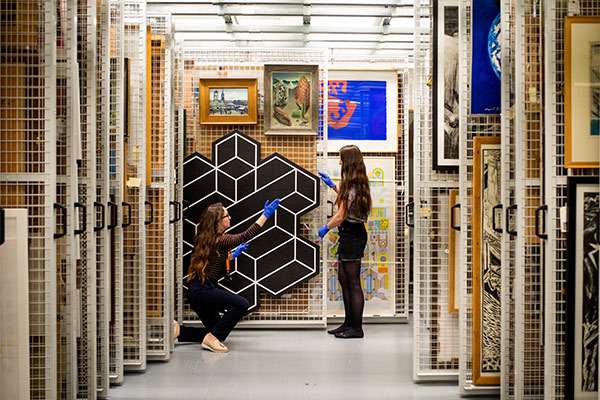View semester dates

BA (Hons) Curating and Art History (with a year abroad)
Combine practical curatorial skills with a deep understanding of art history.
Year of entry: 2026/27
View semester dates
1st in the UK for history of art research impact and environment
4th in the UK for graduate prospects in history of art, architecture and design
7th in the UK for history of art, architecture and design
Why study curating and art history (with a year abroad) at York?
Develop skills in curating for different spaces, such as galleries, museums and heritage sites. Studying this alongside art history will allow you to combine theory and practice, and teach you to create meaningful curatorial experiences in a variety of settings.
Work directly with the University’s 900+ piece art collection, which includes works from Barbara Hepworth, Austin Wright and many more. You’ll also engage with the University curator and dedicated curating space in our Grade II listed Heslington Hall.
Study or work abroad with one of our international partners. If you choose to study at another university, you'll explore their exciting array of modules. You'll immerse yourself deeply in the cultures and language of another country. This will help you develop key skills to boost your employability and help you prepare for your final year.
Learn beyond the University and make professional connections to encounter objects in different settings. We offer regular trips to cultural institutions across the country, both as part of your course and as an extracurricular. These are a great way to experience the field directly, gain firsthand knowledge and develop professional connections.
We have an exciting range of international and national partnerships which are fundamental to our teaching. Past Curating and Art History placement hosts for second-year undergraduate students include:
- Arts Council Collection
- Castle Howard
- Crescent Arts, Scarborough
- David Duggleby’s Auctioneers
- National Railway Museum
- The Hepworth Wakefield
- Walker Art Gallery
- York Museums Trust
Our curators and their recent exhibitions
- Vera Mey, Busan Biennale 2024, Busan, South Korea
- Richard McClary, Lenses Across Time: Views of Afghanistan, Hungate Reading Café, Bellerby Court, Hungate
- Richard McClary, Arts of the Islamic World, Borthwick Institute for Archives, University of York
- Elizabeth Prettejohn, Preraffaelliti: Rinascimento Moderno, Museo Civico San Domenico Forlì
- Erhan Tamur, She Who Wrote: Enheduanna and Women of Mesopotamia, ca. 3400–2000 BC, The Morgan Library & Museum, New York
- Erhan Tamur, Reimagining the Galleries for the Art of the Ancient Near East and Cyprus, The Metropolitan Museum of Art, New York
- Amanda Hilliam, Carlo Crivelli: Shadows on the Sky, Ikon Galler
- Jeanne Nuechterlein, Making A Masterpiece: Bouts and Beyond, York Art Gallery
- Amanda Lillie, Leonardo: Experience a Masterpiece, The National Gallery, London
- Richard Johns, Ruskin, Turner & the Storm Cloud, York Art Gallery and Abbot Hall Art Gallery, Kendal
- Michael White, Bauhaus and Britain, Tate Britain.
- Jason Edwards, Turner and the Whale, Hull Maritime Museum
- Vera Mey, Sunshower: Contemporary Art from Southeast Asia 1980s to Now, Mori Art Museum, Tokyo.
- Elizabeth Prettejohn, Albert Moore: Of Beauty and Aesthetics, Museum De Buitenplaats, Netherlands and York Art Gallery.
- Elizabeth Prettejohn, Alma-Tadema at Home in Antiquity, Leighton House
- Jason Edwards, Sculpture Victorious, Tate Britain
- Tim Ayers, Parliament in the Making: St Stephen’s Chapel, Westminster Hall, Parliament, London
- Michael White, Mondrian & His Studios, Tate Liverpool
- Jeanne Nuechterlein, Strange Beauty: Masters of the German Renaissance, The National Gallery, London.
- Amanda Lillie, Building the Picture: Architecture in Italian Renaissance Painting, The National Gallery, London
- Richard Johns, Turner and the Sea, National Maritime Museum
Partnerships
As part of the degree, you'll study a range of art history and curatorial modules. Some of these will take place in a seminar room and others in museums and galleries. You will work both with staff from our department, many of whom are curators with an international reputation, and with museum and gallery professionals, from a range of our partner institutions, including:

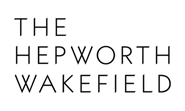
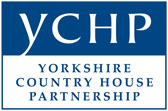
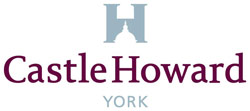
For more on the Department's diverse partnerships with organisations including Tate, the V&A, the National Gallery, York Museums Trust, the National Railway Museum, the Bowes Museum, the Hepworth Wakefield, Middlesbrough Institute of Modern Art, and the Yorkshire Sculpture Park, see York Art History Collaborations.

When I first arrived at the University of York, I didn’t expect to be surrounded by so much art! But as it turns out, art is everywhere you look on campus. Whether it’s in a gallery, outdoors, or even part of the buildings themselves.
Course content
You'll study a wide range of modules that cover the fundamentals of art history and develop a range of approaches to curating an art museum or gallery. You'll also get to plan an exhibition as part of a group project and take a placement with an art institution. We have close relationships with a wide variety of local and national arts and heritage institutions, as well as other third-sector organisations. We also work on art beyond the museum and gallery system, including with partners in country houses, churches and cathedrals, as well as human rights and law enforcement institutions.
Some of the modules you can choose from may include associated field trips to allow you to visit art and architecture. Financial support with transport is usually provided.
Year 1
You'll study a range of modules that will develop your skills in art history and cover a range of approaches to curating art museums. You can also choose to study a language module, several of which are specifically designed for art historians.
With our modules you'll visit works of art and architecture in York and beyond to study them first hand, and you'll explore the material nature of works and learn to describe, analyse and interpret the visual and material qualities of a wide range of media. You'll learn to challenge commonly held assumptions, and develop your skills for literary, critical and rhetorical analysis. You'll be introduced to the history and current practice of art curation. You'll work with case studies and texts and learn about relevant methodologies and conceptual problems, and will critically assess the collection and display of visual objects.
Core modules
- Curatorial Practice Now
- The Art of Looking
- The Practices of Art History
- Materials of Art and Architecture
- Objects in Focus (Curating)
Option modules
You will study one option module. Examples can be found below. Some option module combinations may not be possible. The options available to you will be confirmed after you begin your course.
- Transmissions and Connections
- Learn a language - you have the chance to study a general language module, including medieval or classical Latin, Arabic, Chinese, Italian, Modern Greek and many others. You can also study specialist courses for Art Historians that build reading skills in French, Italian or German.
Academic integrity module
In addition to the above you will also need to complete our online Academic Integrity module.
Year 2
You'll be able to choose from modules across a wide historical, geographical, and theoretical range. The emphasis will be on learning to think about exhibitions and displays. You can also choose to study an art law module, which includes a networking panel with experts in the field.
You'll undertake a curatorial internship which is a placement with an arts institution which allows you to practise the skills you've acquired and to develop your own curatorial interests.
You'll also take part in a group project to plan an exhibition with the University Art Collection. You'll focus on a particular display project or exhibition and explore the full process of developing an exhibition, including object selection and arrangement, the production of interpretive texts, catalogue conception, audience analysis, marketing, fundraising and more. You'll experience at first hand how curatorial theory intersects with the practical demands of planning an exhibition.
Core modules
Option modules
You will study four option modules. Examples can be found below. Some option module combinations may not be possible. The options available to you will be confirmed after you begin your course.
- Italian for Art History Level 2
- Art and Its Institutions
- Research Skills for Art History
- Italian for Art History Level 2
- Journeys, Histories, and Methods of Display
- Curating the Dressed Body in Fashion History
- Interwoven: Fashion and Clothing Communities in Art History (1800 - the Present)
- Fashion, Sustainability, and Ethics
- Art Law
- What is Pop Art?
- Art in the USA 1942-1975
- Surrealism: Art and Liberty
- Made in Italy
- The Future is Still Female: Art and Feminism since the 1970s
- How to Be a Critic
- The Emergence of Photography
- Camera South Asia
- Indo-British Art, c.1527-1947
- Cut / Bite / Stamp: The Power of the Printed Image in Eighteenth-Century Britain
- Painting in Eighteenth-Century Britain
- The English Country House
- Three Rogue Architects
- Images as Knowledge
- Material Encounters in Northern Renaissance Art
- Contemplation, Knowledge and Power: Medieval Maps
- The Arts of Italy and the ‘Global Renaissance’
- Art in Renaissance Florence: Materials, Making, Agency
- From Brick into Stone: Islamic Architecture in Anatolia During the Long Thirteenth Century
- Looting, Acquiring, Gifting: The Islamic Art Market and Museums
- Babylon-Berlin: Ancient Art and Modern Museology
- Art and Iconoclasm: The Power of Images
- The First Cities: Art and Architecture of Ancient Mesopotamia
Elective modules
You may be able to replace one option module with an elective module, studying a complementary subject, a language or an interdisciplinary topic.
Year 3
You'll live, study, and potentially work abroad, combining university study with an international vocational opportunity. The department has a number of partners in Europe and China, but you’ll also be able to make use of the university’s partners in the World University Network, and partners beyond the university as well. During the year, you'll study modules on offer at your host institution and you'll pay a reduced fee to York for that year of study. Your assessment will be via two modules, in which you'll write a 2000-word essay, in English, discussing your experience abroad, and assessed by the York department.
Our current international partners
- Lund University, Sweden
- University of Cologne, Germany
- University of Florence, Italy
- University of Leiden, the Netherlands
- University of Paris 1 Panthéon-Sorbonne
- University of Peking, China
- University of Vienna, Austria
Elective modules
You may be able to replace one option module with an elective module, studying a complementary subject, a language or an interdisciplinary topic.
Year 4
In your fourth year, you'll continue to explore your own interests from a wide variety of time periods, contexts and media.
You'll also work on your 7,000-8,000-word dissertation. This will give you a chance to explore an interesting topic in significant detail, and must have a significant curatorial aspect.
Option modules
You will study four option modules. Examples can be found below. Some option module combinations may not be possible. The options available to you will be confirmed after you begin your course.
- Journeys, Histories, and Methods of Display
- Curating the Dressed Body in Fashion History
- Interwoven: Fashion and Clothing Communities in Art History (1800 - the Present)
- Fashion, Sustainability, and Ethics
- Art Law
- What is Pop Art?
- Art in the USA 1942-1975
- Surrealism: Art and Liberty
- Made in Italy
- The Future is Still Female: Art and Feminism since the 1970s
- How to Be a Critic
- The Emergence of Photography
- Camera South Asia
- Indo-British Art, c.1527-1947
- Cut / Bite / Stamp: The Power of the Printed Image in Eighteenth-Century Britain
- Painting in Eighteenth-Century Britain
- The English Country House
- Three Rogue Architects
- Images as Knowledge
- Material Encounters in Northern Renaissance Art
- Contemplation, Knowledge and Power: Medieval Maps
- The Arts of Italy and the Global Renaissance
- Art in Renaissance Florence: Materials, Making, Agency
- From Brick into Stone: Islamic Architecture in Anatolia During the Long Thirteenth Century
- Looting, Acquiring, Gifting: The Islamic Art Market and Museums
- Babylon-Berlin: Ancient Art and Modern Museology
- Art and Iconoclasm: The Power of Images
- The First Cities: Art and Architecture of Ancient Mesopotamia
Our modules may change to reflect the latest academic thinking and expertise of our staff, and in line with Department/School academic planning.
Learning outcomes
Every course at York has been designed to provide clear and ambitious learning outcomes. These learning outcomes give you an understanding of what you will be able to do at the end of the course. We develop each course by designing modules that grow your abilities towards the learning outcomes and help you to explain what you can offer to employers. Find out more about our approach to teaching and learning.
Learning outcomes for this course
- Deploy a broad knowledge of varied types of art and architecture from diverse periods and places, together with understanding of their historical, cultural and institutional contexts.
- When encountering new visual material either first-hand or in reproduction, apply high-level descriptive and observational skills, develop critical visual analysis drawing upon an appropriate range of methodological approaches, and identify relevant sources for further research.
- Analyse and evaluate how works of art are presented in museums, galleries and other settings, and demonstrate an understanding of how the contexts of collection, preservation and display have helped to shape the history of art.
- Identify and engage with concepts, values and debates that inform contemporary curatorial practice, drawing on first-hand practical experience.
- Communicate complex ideas effectively, both orally and in writing, well-supported by visual material where required, at varied lengths and registers appropriate to the context and intended audience.
- Confront and interrogate widely-held assumptions, understand how interpretations of culture and its contexts have changed over time both incrementally and in more radical paradigm shifts, and continue to engage critically with future changes in ways of thinking.
- Carry out an original and independent investigative project from beginning to end: identify and assemble relevant primary material, develop relevant methodologies for interpretation, consult significant source materials and experts, manage time in an appropriate framework, and complete the project to a deadline in the required format, and work both independently and as an effective team member in pursuit of an objective, exercising initiative and leadership when appropriate.
- For Curating and Art History with a Year Abroad only. Adapt successfully to unfamiliar contexts and take advantage of the intellectual and wider benefits of intercultural experiences.
Fees and funding
The fees and funding information here is for students starting in the 2026/27 academic year.
If you take a year abroad or year in industry you'll pay a reduced rate of fees for that year.
Annual tuition fees
| UK (home) | International and EU |
|---|---|
| £9,535 (TBC) | £26,900 |
The UK government has announced its intention to increase tuition fees from £9,535 to £9,790 for the 2026/27 academic year. We expect this to apply to new UK (home) undergraduate students starting their studies in September 2026.
UK (home) or international fees?
The level of fee that you will be asked to pay depends on whether you're classed as a UK (home) or international student. Check your fee status.
Fees for subsequent years
- UK (home) fees may increase within the government fee cap in subsequent academic years. We will notify you of any increase as soon as we can.
- International fees are subject to increase in subsequent years in line with the prevailing Consumer Price Index (CPI) inflation rate (up to a maximum of 10%).
More information
For more information about tuition fees, any reduced fees for study abroad and work placement years, scholarships, tuition fee loans, maintenance loans and living costs see undergraduate fees and funding.
Additional costs
Many of the modules you can choose from will have associated field trips to allow you to visit the art and architecture. Financial support with transport is usually provided.
Your third year will be spent abroad with one of our partner institutions and you will pay a reduced fee to York for that year of study.
Funding
We'll confirm more funding opportunities for students joining us in 2026/27 throughout the year.

I attended field trips every two weeks during my first term. The trips gave me a better understanding of conservation, heritage, curatorial practices, and the way that art shapes the places we live in.
York, Oxford, Cambridge, Imperial
Just four UK universities are rated Gold for teaching and top ten for research* in the latest national assessment exercises.
* Awarded joint 10th in the Times Higher Education ranking of the Research Excellence Framework 2021.
Teaching and assessment
You’ll study and learn with academics who are active researchers, experts in their field and have a passion for their subjects. Our approach to teaching will provide you with the knowledge, opportunities, and support you need to grow and succeed in a global workplace. Find out more about our approach to teaching and learning.
Teaching format
You'll be taught by art historians that are writing some of the texts you'll read, as well as curating some of the exhibitions you'll see.
In your first year you'll attend seminars, tutorials, lectures and workshops. As the degree progresses you'll find you spend more time in seminars where you, with a small group of other students and a tutor, will discuss a topic for which you've done preliminary research and preparation. As your studies progress, you will be asked to give presentations or lead the discussions in seminars.
Timetabled activities
In your first year, you can expect:
| Lectures | 1-2 hours per week |
|---|---|
| Seminars | 6 hours per week |
| Tutorials | 1-2 hours per term |
| Workshops | 1-2 hours per week |
These figures are representative of a typical week. Your contact hours will vary throughout the year due to your module choices, non-compulsory classes, exam periods and changes to scheduled activities.
Outside your timetabled hours, you'll study independently. This may include preparation for classes, follow-up work, wider reading, practice completion of assessment tasks, or revision.
In the UK, full-time students are expected to spend 1,200 hours a year learning. That's about 40 hours of classes and independent study each week during semesters. Everyone learns at a different rate, so the number of hours you spend on independent study will be different to other students on your course.
Facilities
The student-run Norman Rea Gallery gallery hosts exciting exhibitions throughout the year and promotes the work of both student and professional artists.
The University art collection contains a wide variety of works, from ancient to contemporary, across a diverse array of materials, including painting, sculpture, ceramics, prints, book art, photography, and textiles. The collection includes key work by internationally significant artists including Barbara Hepworth and Jacob Epstein, Paul Nash and Sydney Nolan, R B Kitaj and Elizabeth Blackadder. The collection is available for innovative curatorial displays and exhibitions on and beyond campus.
There are also many libraries and galleries nearby.
Teaching location
You will be based in the Department of History of Art on Campus West. You will also take advantage of our curatorial facilities and exhibition spaces in Heslington Hall.
York is the perfect place to inspire your studies, with a rich and turbulent history stretching back to the Romans. Today the city boasts beautiful historic architecture, as well as museums, galleries, and archives.
About our campus
Our beautiful green campus offers a student-friendly setting in which to live and study, within easy reach of the action in the city centre. It's easy to get around - everything is within walking or pedalling distance, or you can use the fast and frequent bus service. Take a campus tour.
Assessment and feedback
We use a number of different assessment formats:
- Open papers - a take home exam that lasts for a set amount of days
- Group-project
- Internship portfolio
- Essays
- Research dissertation (of around 7,000-8,000 words).
We'll also ask you to write procedural essays and we'll give you feedback. You'll also be assessed on your performance in seminars.
Careers and skills
You'll develop skills that are attractive to a wide range of employers, but particularly suitable for careers in cultural roles such as gallery/museum curator, the art market, conservation and journalism.
During you'll degree you'll find many exciting opportunities for gaining relevant and useful curatorial and museological skills. In previous years students have worked with organisations such as York Museums Trust, the National Trust and Rievaulx Abbey, on events, exhibitions, heritage and outreach.
Career opportunities
Recent graduates from the department have gone on to roles that include:
- Curator
- Gallery director
- Conservation officer
- Art consultant
They've worked for a range of organisations including:
- National Museum of Wales
- Museums Sheffield
- Sotheby's
- Christie's
- BBC
Transferable skills
As well as gaining skills applicable to art history and curatorships you'll also develop skills that can be used across academic disciplines and throughout your career:
- Researching complex topics
- Thinking analytically and independently
- Presentation and team working
Entry requirements
| Qualification | Typical offer |
|---|---|
| A levels | AAB You do not need an A level in History of Art. |
| Access to Higher Education Diploma | Obtain Access to HE Diploma with 36 credits at Distinction and 9 credits at Merit or higher |
| BTEC National Extended Diploma | DDD |
| European Baccalaureate | 80% |
| International Baccalaureate | 35 points |
| T levels | Distinction overall including grade A in the Core T Level subjects in Accounting; Design and Development for Engineering and Manufacturing; Design, Surveying and Planning for Construction; Digital Business Services; Digital Production, Design and Development; Digital Support and Services; Engineering, Manufacturing, Processing and Control; Finance; Health; Healthcare Science; Legal Services; Maintenance, Installation and Repair for Engineering and Manufacturing; Management and Administration; Marketing; Science |
| Scottish Highers / Advanced Highers | Scottish Highers - AABBB Advanced Highers - not required for entry We may also be able to consider three Advanced Highers or a combination of Highers and Advanced Highers, where an applicant does not meet the grade requirement through Highers alone. Please contact us to discuss your qualifications. |
| UAL Level 3 Extended Diploma in Art and Design | Distinction. We will also consider other qualifications from the University of the Arts London in different specialisms, at Level 3 or higher. |
| International foundation programme | Foundation Certificate from our International Pathway College or an appropriate alternative. |
| Other international qualifications | Equivalent qualifications from your country |
Alternative offers
Meeting the following additional criteria may qualify you for an alternative offer.
| Criteria | Adjustment |
|---|---|
| Widening participation | BBC This is conditional upon successful completion of the WP programme including the YorJourney module (Black Access Programme, Next Step York) or successful completion of Realising Opportunities More about widening participation. |
| Contextual offer | ABC |
| EPQ | If you achieve C or higher in the EPQ, you may be eligible for an alternative offer up to one A level grade (or equivalent) below our typical offer. |
| Core Maths | If you achieve B or higher in Core Maths, you may be eligible for an alternative offer up to one A level grade (or equivalent) below our typical offer. |
| MOOCs | If you successfully complete our online course Modern Sculpture: An Introduction to History of Art, you may be eligible for an alternative offer up to one A level grade (or equivalent) below our typical offer. Details about how to evidence completion of the MOOC will be sent in your offer letter. Please note: you do not need to pay for the certificate. More about MOOCs. |
English language
If English isn't your first language you may need to provide evidence of your English language ability. We accept the following qualifications:
| Qualification | Minimum requirement |
|---|---|
| IELTS (Academic) | 6.5, with a minimum of 6.0 in each component |
| IB English | A score of 4 in English A or 5 in English B (Higher Level or Standard Level) |
| Cambridge CEFR | 176, with a minimum of 169 in each component |
| Oxford ELLT | 7, with a minimum of 6 in each component |
| Oxford Test of English Advanced | 136, with a minimum of 126 in each component |
| Duolingo | Integrated subscores: 120 overall, with a minimum of 105 in each component |
| GCSE/IGCSE/O level English Language (as a first or second language) | Grade C / Grade 4 |
| LanguageCert SELT | B2 with a minimum score of 33/50 in each component |
| LanguageCert Academic | B2 with a minimum score of 33/50 in each component |
| Kaplan Test of English Language | 478 Main Flight score with 444 in each component |
| Skills for English | B2: Merit overall, with Pass with Merit in each component |
| PTE Academic | 61, with a minimum of 55 in each component |
| TOEFL | 87 overall, with a minimum of 21 in each component (taken before January 2026) 4.5 with 5 in Listening and 4.5 in each other component (taken after January 2026) |
| Trinity ISE III | Merit in all components |
| Other English language qualifications | We also accept other English Language qualifications, including various school-leaving certificates. |
For more information see our undergraduate English language requirements.
If you haven't met our English language requirements
You may be eligible for one of our pre-sessional English language courses. These courses will provide you with the level of English needed to meet the conditions of your offer.
The length of course you need to take depends on your current English language test scores and how much you need to improve to reach our English language requirements.
After you've accepted your offer to study at York, we'll confirm which pre-sessional course you should apply to via You@York.
Next steps
Contact us
Get in touch if you have any questions

Professor Jason Edwards
Discover York






